I Found Nemo and So Much More... Past Review
By Melissa W (Marine Biology and Biological Oceanography., University of Maine at Orono) - abroad from 02/05/2012 to 06/19/2012 with
ISA Study Abroad in Townsville, Australia
I learned a lot about myself while I was abroad and I felt that I gained a lot of experience in being more independent. While you're abroad, you can't just call your parents and expect a lot of help from them if you have a problem. For me, this was the first time I had to make my own travel arrangements for big trips, navigate large cities alone, and even fly alone. It was a little scary at first, but I think the lesson in independence really helped in preparing me for stating my own life away from home after I graduate. Also, I always knew I wanted to travel, but I never really had the confidence to do so by myself. Now that I've studied abroad, I'm pretty confident in the fact that I could backpack alone or with a friend just about anywhere in the world when I save up enough money. My experience was absolutely worthwhile and I would do it again in a heartbeat (though I'd probably do a few things differently). I can't wait to go back (and potentially work there) when I have enough money to fly back!
Review Photos
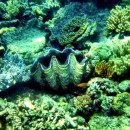
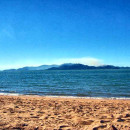
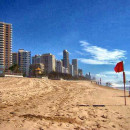
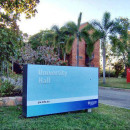
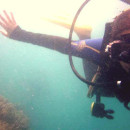
Personal Information
| How much international exposure did you have prior to this program? | 0-2 weeks |
Review Your Program
|
* Overall educational experience
Academic rigor, intensity, resources, etc. |
Courses were very intense and the adjustment between American-style assignments and Australian-style assignments was difficult at times. Study abroad office and professors were very helpful and field trips were great. |
|
* Host Country Program Administration
On-site administration of your program |
GlobaLinks was very informative and helpful during our orientation in Cairns and our on-site rep in Townsville was very good at reaching out to the group and coordinating events. |
|
* Housing:
How satisfied were you with your living arrangements? |
University Hall was a classic dorm setup (long halls, mixed gender hallways) and the fact that it was all singles was very nice and quite different from American universities. Rooms in Uni Hall have no air conditioning (though the Uni Hall townhouses do, but they cost more), but each room has a high-powered ceiling fan and a balcony which I found was more than adequate for keeping cool except maybe for the first few weeks of February when it was about 100+°F (~37°C). Overall I had a very good experience with Uni Hall and found that the level of camaraderie was great. The only real issues I had with Uni Hall is that I found my RA was a bit stand-offish and did not make herself as available to her hallmates as an American university's RA would have. There was also a bit of hazing during O-week which made me a bit uncomfortable, but after that week the upperclassmen were just fine. |
| * Food: |
The dining hall food was pretty mediocre and lacked variety, which actually made me miss dining hall food from home, but alas, there was always PB&J. There were sometimes issues with vegetarians getting their meals taken by non-vegetarians because the vegetarian options were sometimes more appealing, and gluten-free dietary restrictions were a little tricky. I had a habit of going for Vegemite toast and ice cream in lieu of other dinner options...so beware of the carbs and fat. |
|
* Social & Cultural Integration:
How integrated did you feel with the local culture? |
I felt pretty well-integrated with Aussie culture towards the end of my stay in Townsville, but the fact that most Americans tended to stick together made us stand out like sore thumbs. Compared to when I first got to Australia, however, I felt very comfortable navigating any city setting and using public transportation by the end of my stay and felt very much at home in Queensland. |
|
* Health Care:
How well were health issues addressed during the program? |
I experienced several accidents/injuries while at JCU, and two out of three of my medical visits were unsatisfactory compared to my home university's health care system. JCU does not have a health care center directly on campus, but the hospital is just down the road (within walking distance) and most study abroad students were referred to the UniHealth clinic attached to the hospital. My abroad insurance covered the cost of my emergency room and scheduled clinic visits. One of my scheduled UniHealth visits was for a very painful heel injury, which, after two weeks of having increasingly intense pain, I had to wait an additional week to get an appointment to be seen. Once I was seen, I had to get an xray done at another facility in a neighboring town and rent crutches from a pharmacy in another town (neither of these were covered by the insurance). This was very stressful given my inability to walk and my unfamiliarity with the public transportation system at the time. As a rule of thumb, UniHealth is generally booked two weeks in advance and if you're lucky you might get an earlier appointment as a result of a cancellation. I also had to make a trip to the emergency room due to the fact that I still could not book an appointment with UniHealth less than two weeks in advance despite an intensifying bacterial infection in my knee resulting from a cut on my leg. The wait in the emergency room was long (same as any ER in the United States), but the doctor and med student who saw me were very helpful in getting me the antibiotics I needed quickly. Birth control is relatively easy to get prescribed if you have an existing prescription, but this is not covered by the insurance either (though I found it was cheaper than most American birth control costs). |
| * Safety: |
I felt mostly safe in Townsville, especially during the day and on campus. Downtown (where most of the bars and clubs are on Flinders Street) gets a bit sketchy at night, but I felt like there was usually good police presence in case of any conflict. I would not advise staying out in downtown Townsville past 4am unless you are in a large group. |
| If you could do it all over again would you choose the same program? |
Yes
|
Finances
|
* Money: How easily were you able to live on a student's budget?
(1 = not very easy/$200+ on food & personal expenses/week, 2.5 = $100/week, 5 = very easily/minimal cost) |
I definitely spent more in Australia than I would have on a regular basis in Maine. Going out is a lot more expensive (drinks and taxis are way more expensive, try to take the bus and drink before going out if you can) and the accessibility of travel was always very attractive. I tried to keep my spending under $50/week, but it was difficult at times depending on what activities you're doing. Weekends that I traveled to places like Brisbane or Sydney it was not uncommon to spend upwards of $100 in a weekend. |
| * Was housing included in your program cost? | Yes |
| * Was food included in your program cost? | Yes |
| Not including program expenses, about how much money did you spend on food and other expenses each week? | About $20-$30/week depending on frequency of snacking or going out to eat. |
| Do you have any general money-saving tips for future study abroad participants? | Try to take the bus as much as you can or make friends with people who have cars. The bus service offers weekly passes that can be bought in the bookstore (they run out within the first few months though, so stock up) and these really help out in saving money. If you're flying places, you can usually get pretty cheap flights if you book close to the date with Jetstar or Virgin (check out Jetstar's Friday Frenzy). Jetstar and Virgin are definitely the cheapest airlines (great if you don't mind a crappy airplane) and you can save even more money if you pack light and don't check any bags. Drinking and going out is really big at JCU, so to save money I would advise drinking before you go out, trying to avoid buying drinks at clubs, and going for cheaper alcohol (boxed wine is about the same price as in the States, but beware, it tastes awful and it's really not great for you or your decisions). Try to take as much advantage of your meal plan as you can and try to avoid going out to eat if you can (if you're traveling, try going for cheap groceries, as most hostels have a kitchen). Also, hotels are overrated. Hostels in Australia are very nice and I always felt safe in the ones I stayed in (although the beds and other amenities might suck and you should always check for bedbugs) and it's a good way to meet a lot of cool people who are backpacking. |
Language
| * Did your program have a foreign language component? | No |
Other Program Information
|
* Where did you live?
Select all that apply |
|
|
* Who did you live with?
Select all that apply |
|
|
* Who did you take classes with?
Select all that apply |
|
| About how many local friends did you make that you will likely keep in touch with? |
A Look Back
| * What did you like most about the program? |
|
| * What could be improved? |
|
| * What do you know now that you wish you knew before going on this program? | I wish I had been a bit more familiar with how public transportation worked before going on the program, but after spending months figuring it out, I'm a pro. I also went to Australia leaving a long-term boyfriend at home...needless to say it didn't work out with the distance and I wish I had followed people's advice and taken a break before going abroad. Of course some people's relationships work out just fine, but it requires a lot of time and effort and being abroad puts a lot of unnecessary strain on the relationship. Going with no obligations would have been much easier. I also wish I could have gotten more information on volunteer opportunities before I had gone. I was a little late to the game in applying as a volunteer at Reef HQ, but that would have been a really cool opportunity if it had worked out. There are a lot of opportunities to volunteer with research at the university and with conservation organizations that people should definitely look into and make time for before they even get to Australia. |
Individual Course Reviews
| Course Name/Rating: |
Coral Reef Geomorphology |
| Course Department: | Earth & Environmental Sciences |
| Instructor: | Scott Smithers |
| Instruction Language: | English |
| Comments: | Scott is very fun and upbeat and his lectures were always very interesting. not having much experience with geology, this course was a challenge for me, but i learned a lot about the formation of coral reefs that i otherwise would never have learned. labs were always fun and informative. the field trip to Orpheus Island was fun, but very busy and exhausting. the resulting field report was kind of tough. i felt that the assignments for this class were more open-ended than any of my other classes and i think that, above all, was the most challenging coming from an american university. |
| Credit Transfer Issues: |
| Course Name/Rating: |
Evolution and Life History of Reef Corals |
| Course Department: | Marine Biology |
| Instructor: | Bette Willis |
| Instruction Language: | English |
| Comments: | i learned so much in this class and the lab portions were always profitable and very in formative. the lab reports were intense and were definitely a change from my home university. our field trip to Orpheus Island was amazing and my only regret is that i had to stick to snorkeling instead of diving. the final report on the experiment with our assigned coral species was really tough but the class as a whole was very fulfilling. |
| Credit Transfer Issues: |
| Course Name/Rating: |
Biogeography and Evolution of Marine Organisms |
| Course Department: | Tropical Marine Biology |
| Instructor: | Dr. David Bellwood |
| Instruction Language: | English |
| Comments: | I learned a lot about the concept of biogeography, which was a very new topic for me that had not been covered at my home university. This course also was very beneficial towards my understanding of geological history, and had a lot of overlap in terms of geology with Scott Smithers' Coral Reef Geomorphology class. There weren't any field trips, which was disappointing, but the labs provided a comprehensive understanding of the analytical methods of biogeography. Exams were harder than expected for a 2000 level class, and focused more on specifics than general concepts. |
| Credit Transfer Issues: |
| Course Name/Rating: |
Conservation of Marine Mammals, Birds, & Reptiles |
| Course Department: | Environmental Sciences |
| Instructor: | Dr. Mark Hamann |
| Instruction Language: | English |
| Comments: | Lectures consisted mostly of basic, intuitive information, with some insights into conservation management and analysis techniques. Homeworks, group projects, and take-home exams were sometimes frustrating due to wording and lack of clarity. No field trips, but the class on the whole was fairly easy. |
| Credit Transfer Issues: |








